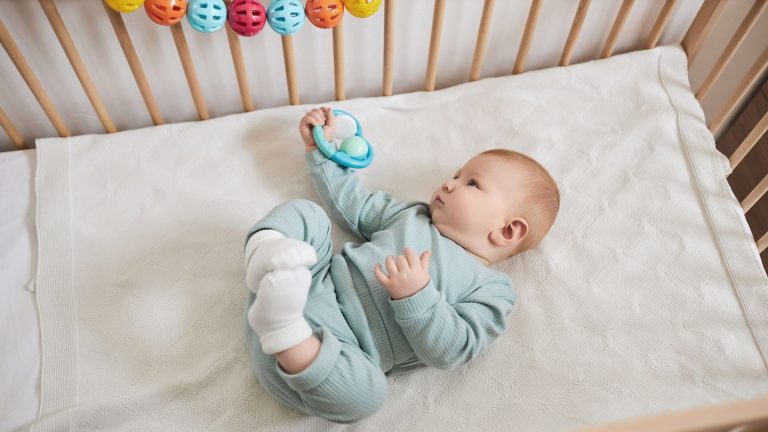How to Handle an 11-Month-Old’s Separation Anxiety?

As your 11-month-old grows, you might notice a new challenge: tears and clinginess when you try to leave. This behavior, known as separation anxiety, is a normal part of your baby’s development.
It often emerges as your little one’s schedule evolves at 11 months old. While it can be tough for both of you, there are effective ways to handle this phase.
In this article, we’ll explore what causes separation anxiety in babies and provide practical strategies to help your baby feel secure.
We’ll cover creating comforting routines, easing transitions, and building your child’s confidence.
With these tips, you’ll be better prepared to support your baby through this important stage of emotional growth.
Immediate Steps to Manage Separation Anxiety
Every goodbye is a chance to build your baby’s confidence. These practical steps will help make separations smoother for both of you, turning challenging moments into opportunities for growth and connection.
1. Timing of Departures
Choose calm moments for departures, such as after your baby has rested or eaten. Your little one will be more at ease and better equipped to handle your absence.
Avoid leaving when your baby is tired, hungry, or unwell; these states can make the separation more difficult.
2. Creating a Goodbye Ritual
Develop a short, consistent goodbye routine. This could include a special hug, a cheerful wave, or a specific phrase you always use. These rituals offer comfort and predictability for your baby, helping them understand that you’ll return.
For example, you might say, “Mommy will be back soon. I love you!” and give a quick hug before leaving.
3. Practice Short Separations at Home
Begin with brief moments apart in a safe setting at home. You might step into another room for a minute, then return. Gradually extend these periods as your baby becomes more comfortable.
This helps build their tolerance for separation in a low-stress environment. Start with just a few seconds and work your way up to longer periods.
4. Stay Calm and Positive
Your baby is highly attuned to your emotions. When saying goodbye, maintain a relaxed and upbeat manner. Reassure them confidently that you’ll be back.
Always follow through on your promises to build trust and security. Your calm attitude can help your baby feel more secure about the separation.
Nighttime Separation Anxiety

Bedtime doesn’t have to be a battle. Creating a soothing environment and consistent routine can help your little one feel secure after dark. These strategies will pave the way for peaceful nights and restful sleep.
- Consistent Bedtime Routine: Establish a calming, predictable bedtime routine. This might include a warm bath, reading a story, or singing a lullaby. A consistent routine helps your baby feel secure and prepares them for sleep. Aim to do the same activities in the same order each night.
- Transitional Objects: Allow your baby to sleep with comfort items like a small blanket or soft toy. Make sure it’s safe and suitable for their age to prevent any hazards during sleep. Introduce the object during daytime play so your baby associates it with comfort.
- Avoid Reinforcing Anxiety: If your baby wakes up crying, offer brief comfort without picking them up. Encourage them to settle back to sleep on their own. This helps them learn to self-soothe and reduces dependence on your presence for sleep. You might gently pat their back or speak softly to reassure them.
Long-Term Separation Anxiety Management
Building independence takes time. These approaches will help your baby grow more comfortable with separations as they develop:
- Fostering Independence: Encourage your baby to explore their surroundings while you watch from nearby. Let them crawl or toddle into another room and come back to you. This builds their confidence in moving away from and returning to you. Praise their efforts to be independent.
- Building Trust: Always return when you say you will. Consistency in your actions helps your baby feel secure and builds their trust in the world. If you say you’ll be back after lunch, ensure you are.
- Seeking Professional: Help If separation anxiety persists for an unusually long time or significantly disrupts daily life, consult your pediatrician. They can provide additional guidance and ensure there are no underlying issues. Don’t hesitate to ask for help if you’re concerned.
Conclusion
Helping your baby through separation anxiety is a journey that requires patience and understanding. By implementing these strategies, you’re easing current distress and laying the foundation for your child’s emotional resilience.
Remember, this phase is a sign of your baby’s healthy attachment to you and growing awareness of the world. Consistency in your approach and lots of love and reassurance will guide your little one through this challenging but important developmental stage.
If you find that anxiety persists or intensifies, don’t hesitate to seek advice from your pediatrician. Every baby is unique, and what works best may vary.
Trust your instincts, stay positive, and celebrate the small victories along the way. Your supportive presence is the key to helping your baby confidently navigate this phase.






